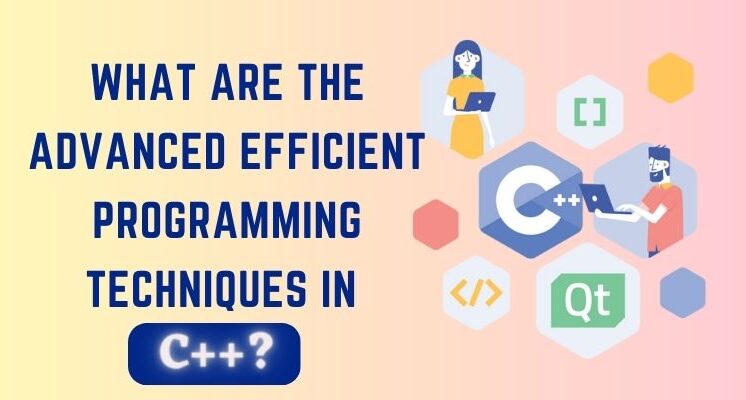What are the Advanced Efficient Programming Techniques in C++?

Efficiency in programming is a crucial aspect of writing high-performance software. In C++, a powerful and versatile programming language, developers can employ several advanced techniques to optimize their code and achieve better performance. This blog will explore “What are the Advanced Efficient Programming Techniques in C++?”. Join C C++ Training in Chennai, learn from Syntax to Advanced Techniques, and Acquire In-Depth Knowledge and Skills to Excel in C++ Programming.
Innovative Usage of Pointers and References
Pointers and references are essential C++ elements that can significantly improve code efficiency. References offer a transparent and secure way to work with objects without the cost of copying, whereas pointers allow direct memory manipulation and access. Pointers and references can be used wisely to save memory and speed up execution.
Move Semantics
With the intro of move semantics in C++11, resources can now be efficiently transferred across objects without needing to be copied. Large objects like containers or intricate data structures can significantly benefit from this. Unneeded copying can be reduced using move constructors and move assignment operators, significantly improving speed.
Inline Functions
Small functions called “inline” don’t require function calls because their scope is increased at the place of the call. When a function is labelled as inline, the compiler is told to add the function’s code to the calling code. This technique can increase efficiency, especially for frequently used tiny routines, even though the compiler may disregard the request for inlining.
Compiler Optimization Flags
Modern C++ compilers come with various optimization flags that can be applied during compilation. These flags control optimization processes like loop unrolling, constant propagation, and dead code elimination. By selecting the appropriate optimization level, developers can significantly enhance the runtime performance of their applications. Join the C++ Online Course and learn how to boost code performance and efficiency with expert compiler flag techniques.
Custom Memory Allocators
The default memory allocation mechanisms in C++ can sometimes introduce overhead due to fragmentation and allocation/deallocation costs. Designing custom memory allocators tailored to specific usage patterns can lead to more efficient memory management. Techniques like object pooling and memory arenas can reduce memory fragmentation and improve memory access patterns.
Multithreading and Parallelism
Implementing multithreading and parallelism has become crucial for optimal performance with multi-core computer development. C++ has a rich standard library for concurrent programming with tools like ‘std::thread’ and ‘std::async’. To ensure effective utilization, careful synchronization and load balancing are required.
Template Metaprogramming
Template metaprogramming is a powerful technique are used to perform computations at compile time. This can lead to code that is more efficient than equivalent runtime computations. Techniques like template specialization and const expr functions allow developers to harness the complete potential of template metaprogramming.
Cache Awareness
Efficient memory access is crucial for performance, and understanding the hierarchy of CPU caches can help optimize data layout. By arranging data structures to fit within cache lines and minimizing cache misses, developers can significantly improve the speed of memory-intensive applications.
Profiling and Benchmarking
Tools for profiling and benchmarking are essential for locating performance problems and bottlenecks. Developers can successfully target optimisations using profiling tools, revealing where most of the code is spent. Using benchmarking tools, developers can assess the effects of modifications and confirm that optimisations lead to performance increases.
Mastering advanced, efficient programming techniques in C++ requires a deep understanding of the language, features, and underlying hardware. By employing intelligent pointer usage, move semantics, inline functions, compiler optimization flags, custom memory allocators, multithreading, template metaprogramming, cache awareness, and proper profiling, developers can create high-performance C++ applications. Join the C Programming Classes in Coimbatore and embark on a journey to becoming a proficient C++ programmer and confidently tackle diverse coding challenges.
Read also: What are the uses of C++?